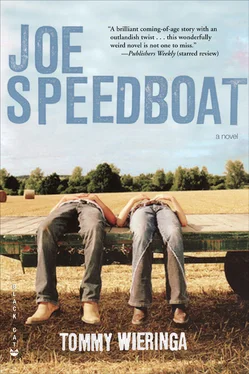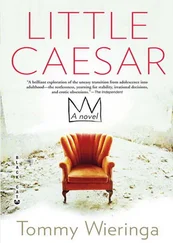Joe was now one of the men in orange overalls, on the grounds themselves he had to wear a white hard hat. It had never occurred to me that someday he would have to work for a living like everyone else. When the water went down he walked to work; sometimes his mother walked with him, on her way to the river to see if Papa Africa had come back yet. They would say goodbye at the gates, Joe with lunchbox in hand and a lump in his coat pocket where he kept an apple or an orange. The day crew would gather in the canteen to run through the production schedules, then they all went to their posts. Joe climbed into the cab of the Liebherr, slid his butt back and forth in the seat until he was comfortable, then started the engine. The machine coughed thick, black smoke, Joe revelled in the way the engine throbbed. The heating and the radio he always turned all the way up. Radio, Joe said, is the opiate of the working man.
The grounds were dotted with hills of sand and gravel that had been brought in by barge. In accordance with the operator’s directions, it was Joe’s job to continually fill the dosers: huge, partitioned hoppers that held the ingredients for the asphalt. He drove back and forth between the dosers and the piles of minerals, which he bit off in chunks. From the dosers the material went by conveyor belt into the bowels of the asphalt machine.
Lunch was at twelve-thirty.
‘What’s up?’
‘Aw, nothing.’
‘Got in late last night, I guess.’
‘No, not this time either.’
‘Oh. So what else is up?’
‘Aw, nothing much.’
And so spring came. But east wind and spring storms came as well, to punish those who had rejoiced too soon. The trees in the cemetery drummed their wooden fingers against the back of my house. The windows were steamed, I read in the piles of newspapers that the E981 would almost definitely bypass Lomark completely. The municipal newsletter said that a committee had been set up to protest against the decision. The members feared that the village would be caught between the two transport arterials into Germany: the river on one side and the E981 on the other, especially if Lomark had no exit of its own. That was crucial. The only way to reach us then would be to get off at Westerveld and drive along the dyke to Lomark. It was a monstrous plan.
Signs appeared along the national highway in the pastures of farmers who sympathized with the protesters. LET LOMARK BREATHE was the most poetic one. It was the brainchild of Harry Potijk, chairman of the committee of the same name. Potijk compared the walling-in of Lomark with suffocation; this imagery had more impact than any subtle argumentation. Harry Potijk was the ideal spokesman, and this was to be his finest hour. For twenty years he had been chairman of the local historical society, and he could orate like the old-fashioned books he had digested during countless hours of autodidactic effort. With the arrival of the E981, his life — uneventful till then — took on the glow of an ideal. He was given the opportunity to advance the committee’s arguments during a Town Council meeting.
‘And if a sound barrier is built, as indicated in the plan before us,’ he said, ‘and the river rises, what then? We will be trapped like rats. There will be nowhere for us to go, the dyke road is flooded, our homes are filling with water and the only route of escape is hermetically sealed with a sound barrier.’
He paused to allow his words to sink in with the council and the public gallery.
‘My question then, Mr Chairman, is this: do you plan to equip each household with a rubber boat?’
Scornful laughter rose from the gallery.
‘Please stick to the facts at hand, Mr Potijk,’ the chairman said.
Potijk gave a servile nod, but that was a ruse.
‘And if you say that the water will never reach such heights, what do you know of climatic change around the world? Of the ecological imbalance now blamed on global warming? Of the melting icecaps?’
At this point in his speech he pointed dramatically at the wall, on the other side of which rivers churned and the earth hissed with heat.
‘Has it slipped your mind that the river this summer reached an all-time low, and that a few years back the water was higher than it has ever been before? Have you forgotten so soon? Even Mr Abelsen, a man known to you, now ninety-three years of age, has never in his life seen the water so high. There are forces at work about which we know nothing and which we cannot predict, so that we must take into account today what seems only a doomsday scenario in the distant future. .’
The committee’s proviso was clear as a bell: the motorway could be tolerated as a fait accompli , but not the lack of an exit and entrance ramp at Lomark. Lomark must be given its own exit and entrance, a windpipe, an asphalt smoker’s lung.
When Harry Potijk realized that there was little he could expect from the mediocre-minded town fathers, he piloted his supporters along a more radical tack: one Wednesday afternoon they left in a hired van from Van Paridon Rentals for the houses of parliament in The Hague. In their imaginations the demonstrators may have been preceded by the sound of fife and drum, but reality consisted of the cobblestones of the Binnenhof beneath a gray sky, and no one who listened. A few attempts were made at the yell they had practiced on the bus, but the war cries fell to the earth as mutely as insults in a foreign language. A man with a briefcase and umbrella passed by at one point and inquired politely about the purpose of their gathering.
‘An MP,’ whispered Mrs Harpenau, the librarian.
Harry Potijk rose to his full height and began rattling off the group’s mission statement, but was soon interrupted.
‘Oh, so this is about a highway? But then you’re in the wrong place, you should be at the Ministry of Transport. On Plesmanweg. It’s quite a way from here.’
Dazed, the group left the Binnenhof and headed for the address he’d mentioned, which was indeed a long walk. They stopped along the way for coffee and sandwiches, then it began growing dark. Mrs Harpenau and two of the others wanted to start home, because of the children. . and that was the end of the march on The Hague.
The photo that appeared in the Lomarker Weekly was taken from so far away that the signs were unreadable, and the huddle of protesters looked painfully small there on that huge square.
I’ve kept that photo. It shows how laughable we are, even in the pursuit of good.
The spring fair brought us something new: Mousetown. As an attraction it was fascinating, precisely because it was so dated. You passed through a black curtain and found yourself in a darkened, unpleasantly hot space where the bitter smell of mouse piss and sawdust snapped at your nostrils. What awaited you there was the rather static spectacle of a wooden castle, at eye level for children and wheeled pedestrians like myself. The castle itself was two stories high, lit from the inside by clumsily sunken lightbulbs. The streets around it were illuminated by Christmas lighting, with bright yellow sawdust scattered on the ground. The entire fortress covered about ten square metres and was surrounded by a moat, its water as opaque as that in the water bowl of the guinea pigs Dirk used to keep — all of whom, one by one, had died a death as hideous as it was mysterious.
The element of motion in Mousetown — a fair, after all, is the celebration of flying, spinning and/or swaying movement; little wonder, therefore, that Joe could be found there almost all the time — consisted of a few hundred mice. The visitors watched the rodents swarm with a kind of fascinated horror. The animals pissed, shit and screwed in what in the human world would be called public places, which produced a great deal of laughter. There was a drawbridge leading to an island in the moat which, along with the back wall, formed the edges of the mousy world. The city was rectangular, you could walk around it on three sides, and the back was a plywood barrier crudely painted with clouds and a sun. The city itself was well lit; the area around it, where the people stood and stared at the storybook plague of rodents, was dark as a haunted house.
Читать дальше












